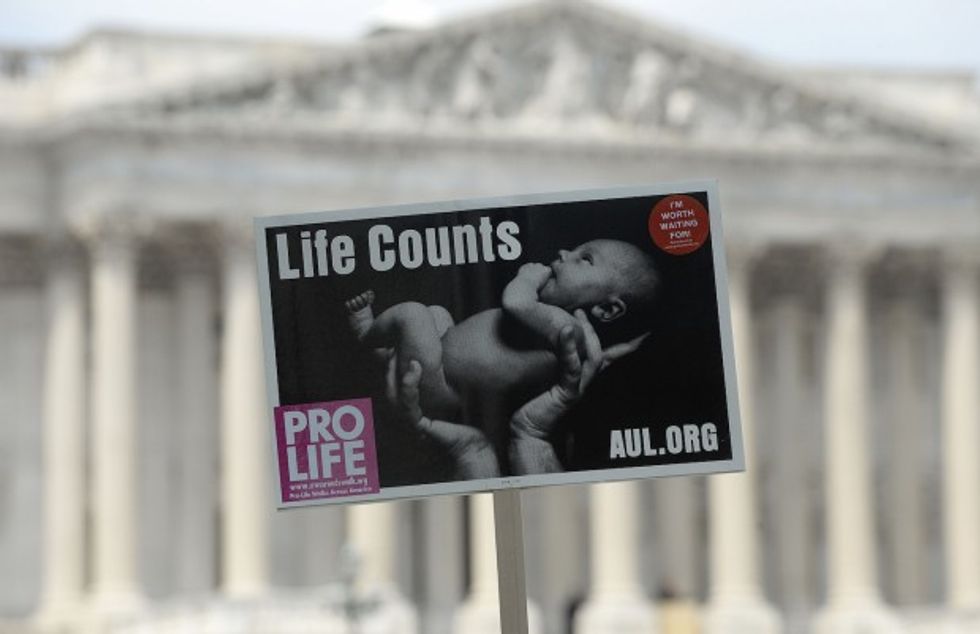
Photo credit: Shutterstock

People of faith have an obvious and immediate interest in the abortion-rights case currently before the Supreme Court, but they may be surprised to learn that the Bible is nearly silent on abortion, and most of the religious teachings about abortion come from revisionist readings. The Bible doesn't prohibit abortion.
There's only one clearly relevant passage about a fetus in the Bible. According to Exodus 21:22, a person is required to pay a fine if he hits a pregnant woman and causes "her offspring to leave her."

The Hebrew wording there is tricky, and even in antiquity there were conflicting understandings of this text, so the nuances of the passage are difficult to pin down. This is why one popular Bible translation, the New Revised Standard Version (NRSV), thinks this is about causing a woman to miscarry, while another, the New International Version (NIV), thinks it's about causing a woman to give birth prematurely.
If the NIV is right, this passage isn't about abortion at all, because the child lives. If the NRSV is right (and this seems likely), then a fetus is not a person, because the Bible expressly forbids monetary damages for killing a person, while the aggressor here has to pay a fine.
Yet various convoluted arguments try to make this text say something it does not.
For example, the Hebrew word for the "offspring" that leaves the mother is yeled, and that word means "child." So some people claim that the fetus here is a child. However, that reasoning is flawed. We see the error from Genesis 25:23, where Rebecca has "two nations" in her womb. No one thinks that the Bible says a fetus is a nation, even though the "nation" is in Rebecca's womb. Similarly, the Bible doesn't say that a fetus is a child.
This common linguistic mistake gets applied to other passages as well. For instance, according to Luke 1:41, Elizabeth's "child" leaped in her womb. But like the "nations" in Genesis, which are "future nations," this is a future child. And at any rate, the leaping is figurative.

Some biblical passages may frown on elective surgery. Leviticus 19:28 and Deuteronomy 41:12 warn people against making cuts on their bodies, and according to 1 Corinthians 6:19-20, people's bodies belong to God, not to themselves. A reasonable generalization of these passages might be that surgery is only permitted for a good reason. If so, abortions might be permitted only for a good reason. But the Bible doesn't give any specific guidelines as to what such a reson might be. And even this line of reasoning is guesswork, because other reasonable generalizations of the text point in different directions.
Though the Bible doesn't prohibit abortions, it also doesn't specifically allow them. But again, some people try to distort the Bible. For example, some people look at the monetary fine in Exodus 21 and, wrongly, conclude that the text permits abortions. But that passage is about someone accidentally causing a woman to miscarry. It's not about purposely performing an abortion. And it's not about what a woman chooses to do to herself.
This silence on abortion is surprising and perhaps troubling, because the Bible shouts the importance of human life. Yet it offers no guidance on when human life begins.
Certainly, though, religious leaders do everyone a disservice when they quote barely relevant biblical passages out of context and otherwise mislead their followers. For the biblically minded, this is a serious issue, and, particularly in this season of politics, it calls for serious debate.
Dr. Hoffman's latest book is The Bible Doesn't Say That: 40 Biblical Mistranslations, Misconceptions, and Other Misunderstandings (2016, St. Martin's Press), which explores what the Bible meant before the last 2,000 years of misinterpretation. He can be reached through his website at www.lashon.net.
–
TheBlaze contributor channel supports an open discourse on a range of views. The opinions expressed in this channel are solely those of each individual author.